Continuously improving your product is a must to keep your solution relevant to the target audience. But version updates, frequent minor changes, and traffic spikes introduce risks to software reliability and scalability. Such risks might cause unpleasant incidents, harming your product’s reputation. And this is where the skills of experienced site reliability engineering (SRE) specialists can come in handy.
Applying the SRE approach means managing a large system with the help of dedicated software tools, which is more sustainable than manually managing hundreds of machines. However, it might be challenging to find SRE specialists who can help you achieve your desired reliability and efficiently collaborate with DevOps and development teams.
In this article, you will find a comprehensive overview of how the SRE approach can benefit your business. We explore main SRE roles and responsibilities and what results to expect from site reliability engineers. We also discuss nuances of SRE outsourcing and offer ways to handle common outsourcing concerns.
This article will be helpful for IT project leaders who are looking for SRE contractors and who want to clearly define the expected advantages of site reliability engineering and the results an SRE specialist should provide.
Contents:
The importance of SRE
What is site reliability engineering (SRE)?
Site reliability engineering (SRE) is an approach to designing and implementing highly scalable, resilient, and dependable IT infrastructure using various software tools. SRE is a tool- and metric-based strategy, and by leveraging its practices, engineers can quickly and efficiently manage multiple systems, solve arising issues, and automate tasks like system management and application monitoring. The main goal of SRE is to improve system reliability and reduce manual workloads.
Ways to choose and implement SRE practices into your project workflow vary depending on your product’s specifics. However, Google offers the following seven principles of site reliability engineering that provide a general understanding of how SRE teams typically work:
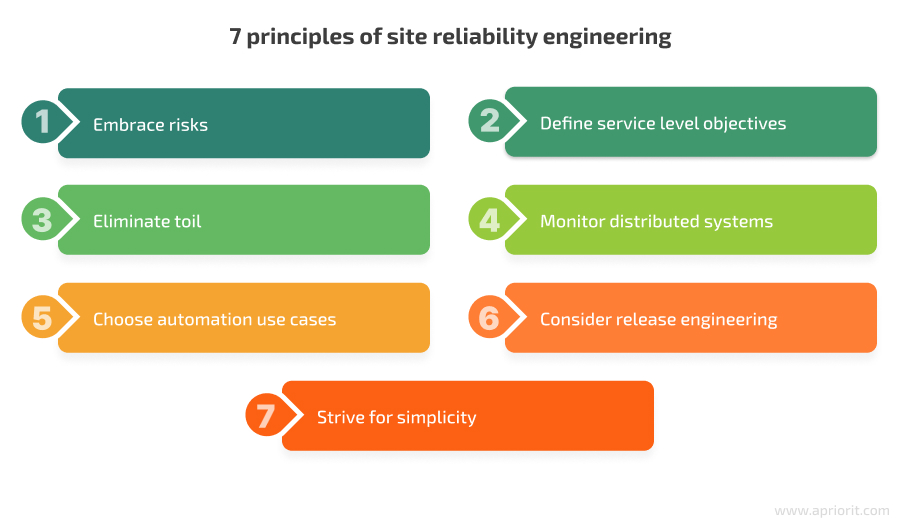
SRE is closely related to DevOps principles, but these approaches differ. For instance, DevOps usually focuses on improving collaboration between development and operations functions, while SRE concentrates on designing and implementing scalable, dependable, and reliable systems. Overall, DevOps and SRE complement each other, and many organizations use them simultaneously.
“One could view DevOps as a generalization of several core SRE principles to a wider range of organizations, management structures, and personnel. One could equivalently view SRE as a specific implementation of DevOps with some idiosyncratic extensions.”
SRE Book by Google
Why do you need site reliability engineering?
The reasons to apply SRE practices vary depending on your project’s needs. Below, we list a few examples of what site reliability engineering can help your team achieve.
| What you can achieve with SRE |
|---|
| Manage the growing complexity of cloud environments |
| Track infrastructure management results to constantly adjust and improve the workflow |
| Ensure application reliability amidst frequent updates from development teams |
| Decrease the number of incidents in production |
| Implement prescriptions and procedures to continuously enhance software performance |
What does a site reliability engineer do?
Site reliability engineers often take both development and system operations roles, designing operations teams. With SRE principles in mind, they focus on how code is deployed and monitored, take responsibility for operational improvements and change management, and, similarly to a DevOps manager, automate manual operations. Thus, SRE specialists can help you achieve a perfect balance between project speed and system strength.
To leverage automation and cutting-edge technologies offered by the SRE approach, you might need a site reliability specialist or a complete SRE team depending on your project’s size, complexity, and requirements.
With basic information about this approach in mind, let’s take a closer look at why SRE practices are worth your attention and discuss their business benefits.
Ready to adopt site reliability engineering?
Focus on your business goals while delegating the reliability of your large-scale systems to Apriorit’s SRE professionals.
Four main SRE advantages for businesses
Below, we explore the four most valuable benefits of SRE you can get when efficiently implementing site reliability engineering practices:
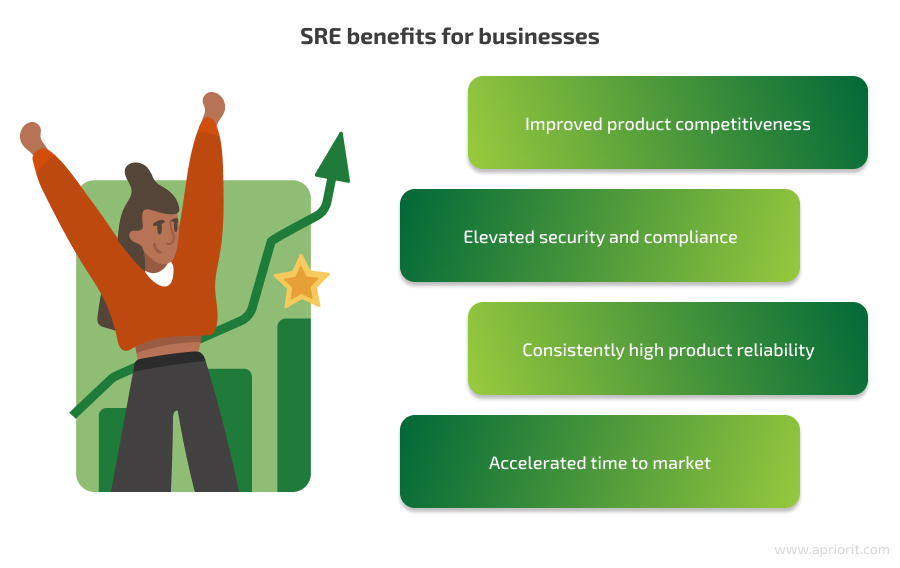
Improved product competitiveness. To increase the chance of end users picking your product instead of a competitor’s, it’s crucial to make your software run smoothly. With SRE’s shift from manual intervention towards automation, your team can significantly reduce downtime and human-made errors, improving the user experience of the final product.
Elevated security and compliance. Just like DevOps, SRE relies on the shift-left approach to security, planning and implementing cybersecurity measures right from the project start. To put it simply, site reliability engineers create a paradigm in which teams identify security issues during the entire development cycle and fix them as soon as they arise. In case your project needs to meet specific regulatory requirements, SRE specialists start taking care of compliance requirements right at the beginning. As a result, you receive a product with few to no security issues.
Consistently high product reliability. A high-quality solution works smoothly even during massive traffic spikes. Site reliability engineers can help you design systems that handle increased loads by applying techniques like load balancing, horizontal scaling, and efficient resource allocation. By ensuring that your solution can seamlessly adapt to rapidly changing user demands without compromising performance, you can keep the project’s quality high, winning end-users’ loyalty.
Accelerated time to market. Proven SRE practices and tools allow site reliability engineers to create a robust pipeline for automating the entire process of building and releasing the final product. Thanks to such automation, your team can develop, deploy, and test new software versions faster, speeding up the time to market.
But to get the most out of SRE, you have to find skilled and competent specialists. Before discussing the specifics of outsourcing these activities, let’s define the key requirements of a talented site reliability engineer.
Related project
Building AWS-based Blockchain Infrastructure for International Banking
Explore a success story of creating efficient, scalable, and secure AWS infrastructure for a project within strict deadlines. Find out how our client’s DevOps engineers leveraged Apriorit’s expertise to support the delivered system and implement further improvements.

What to expect from site reliability engineers
It’s essential to understand the basic knowledge and skills SRE specialists must have and what additional qualifications you might look for. Thus, you can adequately formulate requirements for candidates, aligning them with actual project needs.
Let’s start with listing the most common tasks SRE specialists must perform to establish a robust SRE process:
- Design and maintain high-load and high-availability infrastructure
- Define and implement standards for system architecture, service delivery, and task automation
- Monitor service performance
- Offer ways to increase product availability and improve incident response
- Create an SRE strategy for ensuring the reliability, performance, and availability of digital systems
- Choose the most suitable tools and frameworks for product and engineering teams to deliver reliable services
- Analyze service infrastructure needs and their justification
- Establish alert systems that notify team members when an incident occurs and actively participate in incident response planning and management
- Establish a strong incident management culture and conduct helpful post-incident reviews
- Speed up manual tasks using the best automation tools to eliminate toil and reduce human-related risks
- Maximize system uptime and efficiency for a great end-user experience
When it comes to hard skills, consult your tech leaders on what skills you’re looking for. Each project might require unique expertise and experience working with different tools and frameworks. But most commonly, organizations require specialists with:
- Experience working in engineering and cloud
- Expertise in computer science, cloud architecture, security, or network design fundamentals
- Experience working on production-level network architecture
- An understanding of data protection with system backups, replication, encryption, and secrets management
- Strong skills working with version control systems like Git
- Knowledge of public cloud platforms like GCP, AWS, and Azure
- Proficiency with containerization and orchestration tools like Docker and Kubernetes
- Experience coding in high-level languages like Python, JavaScript, C++, and Java
- Proficiency using infrastructure automation tools like Terraform, Ansible, Puppet, and Chef
The results of an SRE specialist’s work depend on the requirements you state for them. But in general, you can expect the following results for your project when involving site reliability engineers on your team:
| Results to expect from an SRE team |
|---|
| 1. Fast rollout of version updates thanks to reduced toil |
| 2. Improved system monitoring |
| 3. Streamlined incident management |
| 4. Reduction in repair time |
| 5. Increase in mean time between failures |
| 6. Alignment of development and operations |
| 7. Improved security posture |
| 8. Alignment with compliance requirements |
Once you finalize your requirements for and expectations of site reliability engineers, it’s time to choose whether to gather an in-house SRE team or start looking for a trusted vendor.
Read also
IT Outsourcing to Eastern Europe in 2024: A Guide for Businesses
Know how to find the right vendor to delegate your project to. Discover what factors to evaluate when choosing a partner to help you achieve all your business goals and meet all project needs.

What you should know about SRE outsourcing
When bringing your project to the next level using site reliability engineering, a crucial step is choosing a hiring option. You can look for in-house employees or outsource SRE activities to a third-party vendor.
A full-time SRE specialist can quickly build work relations with your development and operations teams as well as deeply understand your business goals and needs. Also, in-house specialists often deliver good results, as they want to be valued and appreciated by the company.
On the downside, finding professional site reliability engineers is tricky and time-consuming. With a shortage of talent in the market, organizations have to compete for candidates. Even if you manage to find employees with relevant skills and experience, you still need to spend time onboarding them and introducing them to the project. With SRE specialists demanding high salaries, retaining such skilled employees might not be justified financially, especially if your company doesn’t need full-time SRE services.
This is where SRE contracting comes into play. Once you know the advantages to expect and nuances to consider, you can choose a reliable SRE outsourcing company to help you deliver a quality product.
5 key advantages of contracting SRE services
Let’s explore why SRE outsourcing is worth your consideration and list five major benefits your business can get from outsourcing site reliability engineering activities to a third-party vendor.
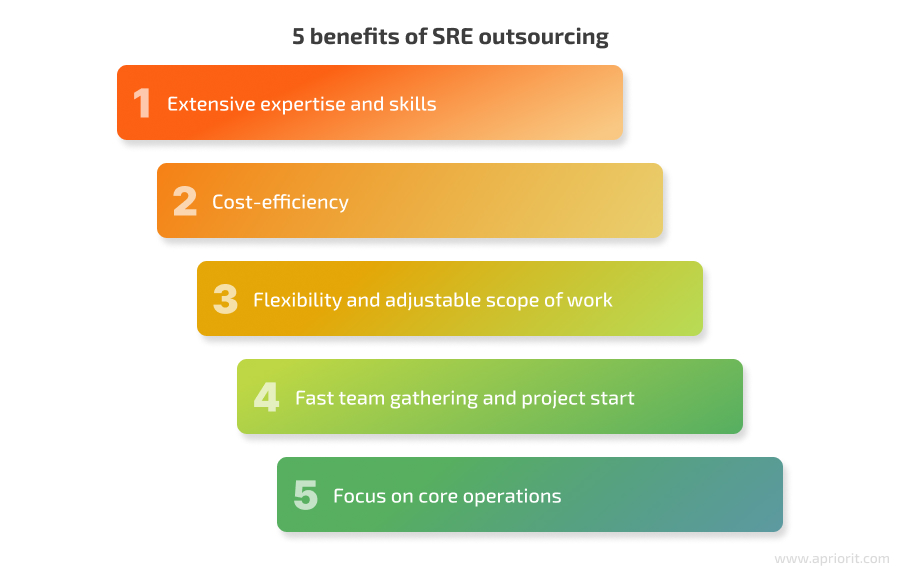
1. Extensive expertise and skills. Professional SRE services bring niche skills and knowledge to your project. With vast experience in different industries, third-party vendors provide fresh perspectives and non-trivial solutions to help you improve project processes and receive desired outcomes. Also, if you have a hybrid team, your in-house specialists can gain additional knowledge and insights from experienced SRE contractors while working together. Thus, you can work with contractors for the planning and development stages, then ensure quality ongoing project support using only your own resources.
2. Cost-efficiency. Services of experienced and skilled third-party SRE specialists and SRE teams aren’t exactly cheap. However, when contracting site reliability engineering services, you only pay for the work delivered, based on an hourly rate or a fixed fee. Thus, you can save money on expenses related to hiring full-time employees (training, infrastructure costs, salaries) when you have little to no project-related work for them.
3. Flexibility and scope of work adjustment. Unlike full-time employees, contractors are more flexible when it comes to working on demand or on short notice. They can also efficiently and quickly adjust the project’s scope or duration in response to arising issues or changes in your business needs. Moreover, professional IT outsourcing companies like Apriorit can quickly find additional site reliability engineers or other tech specialists in case your project requires more skills at a certain development stage. And if at some point your project needs fewer team members, it’s much easier and cheaper to reduce the team size when working with an outsourcing team rather than with full-time employees.
4. Fast team gathering and project start. Since contractors don’t require a complex recruitment process and training, you can start implementing SRE practices faster than with in-house employees. Big outsourcing companies usually have employees with different experience and expertise, so they can quickly assemble a team with skills relevant to your specific project. Also, their specialists can work independently, with minimal supervision.
5. Focus on сore operations. When outsourcing SRE activities to a trusted contractor, you free some in-house resources, allowing your internal team to focus on core business operations and strategic initiatives. It will be easier for them to see the big picture and come up with fresh ideas regarding software improvement when they’re not heavily involved in day-to-day reliability tasks.
Read also
Benefits and Risks of Outsourcing Engineering Services
Discover the real advantages you can get from outsourcing IT services. Find out what concerns to consider and how to handle them when hiring a subcontractor.
Three main SRE outsourcing concerns to overcome
Even with such benefits, contracting SRE services to a third-party development company is a big deal, so having concerns is only natural. Before outsourcing site reliability engineering, make sure to outline your considerations and analyze how to communicate them to candidate contractors.
Let’s explore a few examples of common considerations when contracting SRE services and how to handle them:
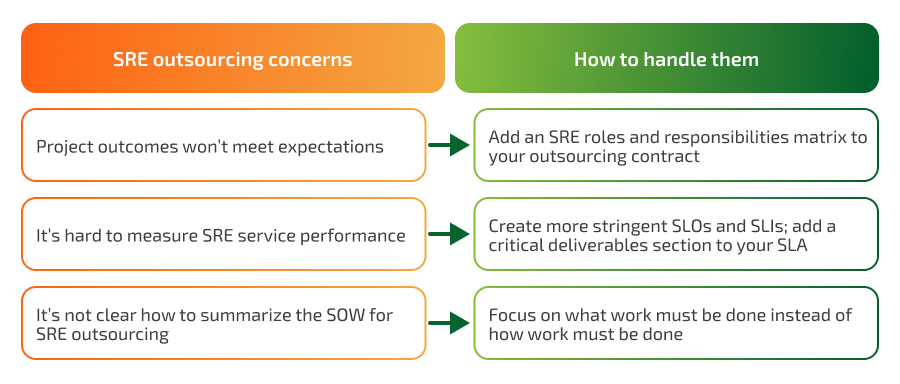
1. Project outcome won’t meet expectations. You might be worried that a chosen contractor might work on multiple projects simultaneously, paying little attention to your product and leading to poor results. However, reliable outsourcing development companies like Apriorit plan their employees’ workloads with regards to the results clients expect to make sure all project goals are achieved. To ensure that your SRE vendor delivers all the services you require, consider adding an SRE roles and responsibilities matrix to your outsourcing contract.
2. It’s hard to measure SRE service performance. You may have concerns about service-level agreements (SLAs) not being enough to comprehensively define expected business outcomes and measurements. In this case, look for experienced SRE contractors who agree to more stringent service-level objectives (SLOs) and service-level indicators (SLIs), and consider adding a critical deliverables section to your SLA. These measures will help your contractor better understand what SRE outcomes you expect and how exactly performance requirements should be met.
3. It’s not clear how to summarize the SOW for SRE outsourcing. The statement of work (SOW) often includes provisions on how work should be performed, listing specific tasks. However, site reliability engineering practices should be flexible in case non-trivial issues arise or project specifics require another approach to SRE. Therefore, consider creating an SOW according to Agile principles, focusing on what work must be done. For example, instead of listing a few very specific incident response tasks your contractor should stick to, ask SRE specialists to perform all activities and services required to maintain and support incident management. Thus, you won’t limit engineers to practices that might lose their effectiveness over time, allowing them to continuously introduce improvements.
Understanding how to handle such considerations is essential to help you choose a reliable team to outsource SRE activities to, as you’ll know what questions to ask when interviewing potential contractors.
Related project
SaaS Growth and CI/CD Process Support with Smart AWS Infrastructure
Discover how our client reduced platform maintenance costs by approximately 40% as we rebuilt their development and deployment environment.
Why choose Apriorit for SRE services?
With professional DevOps and SRE specialists from Apriorit, you can focus on what ultimately matters to your end users: product reliability. Our team will make sure that your services or software are always available whenever your customers need them.
We offer both SRE and DevOps services delivered by smart, experienced, and creative engineers with strong skills in building and maintaining large-scale distributed systems.
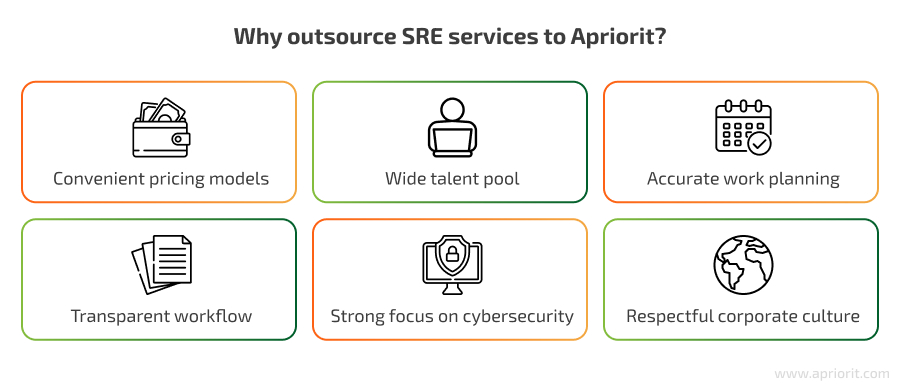
- Convenient pricing models. Pick the payment scheme that suits your project best and achieve desired results for a reasonable price. We offer three outsourcing models: dedicated team, time and materials, and fixed price. Depending on your project’s needs, requirements, and scope of work, we’ll help you choose the optimal scheme so you can get the desired results without overpaying.
- Wide talent pool. Enrich your project team with niche skills and expertise. By outsourcing engineering activities to Apriorit, you’ll receive access to professional DevOps and SRE teams with experience working on products with different technology stacks and for different industries.
- Accurate work planning. Be sure that all work on your project will be delivered on time and meet all of your deadlines. At Apriorit, we pay attention to efficient project management practices to help you achieve proper software reliability.
- Transparent workflow. Know what your SRE contractor is working on during every project stage. Apriorit has established a mature delivery process, combining independence in work with regular reports to clients to make sure everyone is on the same page.
- Strong focus on cybersecurity. Deliver protected solutions and services by leveraging Apriorit’s dedication to cybersecurity best practices. When working on SRE for your project, we’ll make sure to establish top-notch incident management and system monitoring.
- Respectful corporate culture. Feel comfortable working with third-party engineers. At Apriorit, we focus on delivering quality results while being respectful of our clients’ cultures and values. With experience collaborating with clients all over the world, we know how to ensure an efficient and smooth development process and achieve mutual respect.
Conclusion
When you clearly understand why SRE is important and thoughtfully implement SRE practices, you can develop a reliable product, eliminating various security and efficiency risks. Enhancing your DevOps activities with the SRE approach is a great way to deliver competitive software and services.
However, to receive the expected outcome from SRE practices, make sure to outsource such activities to professional and loyal vendors. Consider choosing an IT organization with relevant experience, strong expertise in DevOps and SRE, and a transparent workflow. By doing so, you significantly increase your chances of achieving the desired results.
At Apriorit, we have experienced DevOps and SRE specialists to help you deliver a reliable solution. Thanks to our strong focus on cybersecurity, you’ll receive not only a reliable but also a protected product, winning customers’ trust.
Need to enhance your solution’s capabilities?
Achieve high-level reliability, scalability, and efficiency for your product by leveraging Apriorit’s skills in DevOps and site reliability engineering.


